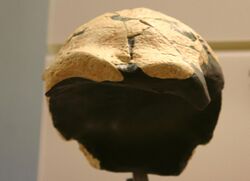Social:Saldanha man
 Saldanha skull, Smithsonian Natural History Museum | |
| Common name | Saldanha man |
|---|---|
| Species | Homo heidelbergensis |
| Place discovered | Hopefield, South Africa |
| Date discovered | 8 January 1953 |
| Discovered by | Keith Jolly and Ronald Singer |
Saldanha man also known as Saldanha cranium or Elandsfontein cranium are fossilized remains of an archaic human. It is one of the key specimens for Homo heidelbergensis. It has not been dated directly, and is estimated to be roughly 0.5 million years old.[1] The remains, which included a fragment of lower jaw, were found on an exposed surface between shifting sand dunes on the farm Elandsfontein, which is located near Hopefield, South Africa .
It was found associated with a variety of fossil vertebrates, and initially classified as Homo saldanensis (Drennan 1955). Singer (1954) noted close resemblance to Kabwe 1 and LH 18.[2] Comparison with Kabwe 1 specifically, and thus classification as Afrian H. heidelbergensis (H. rhodesiensis) was also regularly supported by later authors.[1]
See also
- List of human fossils
References
- ↑ 1.0 1.1 Schwartz, Jeffrey H.; Tattersall, Ian (2005-03-11) (in en). The Human Fossil Record, Craniodental Morphology of Genus Homo (Africa and Asia). John Wiley & Sons. p. 248–255. ISBN 9780471326441. https://books.google.com/books?id=EPKGnF7oZXgC..
- ↑ Singer, Ronald (1954). "The saldanha skull from Hopefield, South Africa". American Journal of Physical Anthropology 12 (3): 345–62. doi:10.1002/ajpa.1330120309. PMID 13207329. http://www3.interscience.wiley.com/journal/110522835/abstract.
- Straus, W. L. (17 May 1957). "Saldanha Man and His Culture". Science 125 (3255): 973–974. doi:10.1126/science.125.3255.973. ISSN 0036-8075. http://science.sciencemag.org/content/125/3255/973.
- Tappen, NC (1979). "Studies on the condition and structure of bone of the Saldanha fossil cranium". American Journal of Physical Anthropology 50 (4): 591–603. doi:10.1002/ajpa.1330500410. PMID 111559. http://www3.interscience.wiley.com/journal/110515503/abstract.

